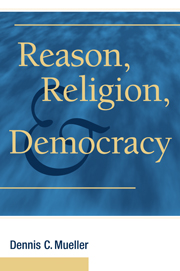Book contents
- Frontmatter
- Contents
- Preface
- 1 Liberal Democracy
- PART I FUNDAMENTALS: EVOLUTION, PSYCHOLOGY, REASONING, AND RELIGION
- PART II A HISTORICAL LOOK AT THE STATE, DEMOCRACY, AND RELIGION
- PART III THE INSTITUTIONS OF LIBERAL DEMOCRACY
- PART IV CHALLENGES TO LIBERAL DEMOCRACY
- 13 Democracy and Religion
- 14 Building and Protecting Liberal Democracy
- References
- Author Index
- Subject Index
14 - Building and Protecting Liberal Democracy
Published online by Cambridge University Press: 05 June 2012
- Frontmatter
- Contents
- Preface
- 1 Liberal Democracy
- PART I FUNDAMENTALS: EVOLUTION, PSYCHOLOGY, REASONING, AND RELIGION
- PART II A HISTORICAL LOOK AT THE STATE, DEMOCRACY, AND RELIGION
- PART III THE INSTITUTIONS OF LIBERAL DEMOCRACY
- PART IV CHALLENGES TO LIBERAL DEMOCRACY
- 13 Democracy and Religion
- 14 Building and Protecting Liberal Democracy
- References
- Author Index
- Subject Index
Summary
In the principle of equality I very clearly discern two tendencies; one leading the mind of every man to untried thoughts, the other prohibiting him from thinking at all. And I perceive how, under the domination of certain laws, democracy would extinguish that liberty of the mind to which a democratic social condition is favorable; so that, having broken all the bondage once imposed upon it by ranks or by men, the human mind would be closely fettered to the general will of the greatest number.
(Alexis de Tocqueville)In 1793, Condorcet drafted a brief history of The Progress of the Human Mind. He traced its development over ten stages from tribal societies up through the Enlightenment. The tenth stage was a prognosis for the future. It was most optimistic. Scientific progress would continue to bring rising living standards and life expectancies; as a result, states would introduce retirement insurance; income equality would increase both across and within countries; universal education would be introduced; free trade, democracy, and human rights would all triumph. Condorcet went so far as to advocate the development of a universal language to facilitate communication across the globe and, of course, to speed up the advance of science.
- Type
- Chapter
- Information
- Reason, Religion, and Democracy , pp. 400 - 418Publisher: Cambridge University PressPrint publication year: 2009
- 1
- Cited by

